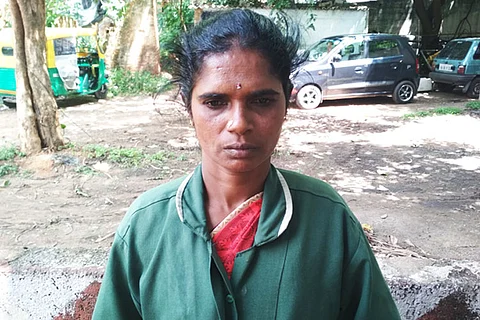

Uma has been a pourakarmika – a civic worker in Bengaluru – for 24 years. She has been keeping the streets of Indira Nagar clean, she has been picking up your garbage, and has been ensuring that diseases don’t spread because of lack of sanitation.
But Uma herself has no healthcare. In fact, for the past six months, the 40-year-old has not received a single rupee of her salary. "I have a daughter who is delivering a baby today and I don't have any money to help her," she says emptying the pockets of her green uniform in a corner of CMH Road in Indira Nagar.
Next to her, 23-year-old Shobha raises the same complaint. "I have not been able to admit my son in a school this year because I could not afford it. The school was asking for Rs 23,000 fees, but I have not been paid since January and the last date to join has now passed," she says with a look of resignation.
Shobha and Uma are not alone. Hundreds of such civic workers across Bengaluru, some of whom have been responsible for the city’s upkeep for decades, have not been paid salaries since January.
Shobha (23) says she was unable to admit her son to school this year
The Bruhat Bengaluru Mahanagara Palike (BBMP) regularised pourakarmikas from January 2018 eliminating the contract system previously in place.
In the present system, the workers are to be paid directly by the government, but payments have not been made since January, forcing the workers to take loans from moneylenders to make ends meet.
"Some have pawned off their jewellery. Some have even sold off utensils at home to continue paying rent and electricity every month. We are down to bare essentials now," says Shobha, who has been working for four years now.
Kondamma says she was forced to move out of her home as she could no longer afford the rent
But in spite of the troubles, the pourakarmikas have continued to work in the last six months in the hope that they will be paid soon. "We are working in the hope that we will be paid the money owed to us soon but every time there is a snag and officials make promises that they never keep." says Uma.
She works for eight hours every day during which she has to administer biometric attendance thrice – at 6.30 am, 10.30 am and 2.30 pm. "If we don't do it at any one time, we are considered absent and we are not eligible for payment on that day," Uma adds. The biometric system was introduced at the same time pourakarmikas switched from the contract system to the current direct payment system in January.
Lakshmi Devi, a pourakarmika working in Indira Nagar
The workers have also not been given basic equipment like hand-gloves, jackets, shoes even after repeated assurances and promises by different ministers and officials. "We pay out of our pockets for gloves, brooms and to repair the waste-collection vehicle whenever it gives trouble," says Uma.
For years, pourakarmikas were paid according to the whims of solid waste management contracts, who they say paid partial salaries and fudged the actual number of workers to claim more money from the BBMP.
It was only in 2017 that then Chief Minister Siddaramaiah announced the regularisation of pourakarmikas. Now, in spite of the BBMP saving money by directly paying the workers bypassing the contract system, hundreds of pourakarmikas say they are not receiving their salaries.
Uma, and several other pourakarmikas have repeatedly raised their complaints with BBMP Joint Commissioner Ashok, to no avail. The pourakarmikas not only want the salaries they are owed but also ESI cards and benefits like paid leaves and sick leaves. "Even when we take time out to protest, we do it at the cost of the day's salary. When we return to work the next day, the residents of the area we clean ask us why we did not turn up to work. When we tell them about the protest and how we have not been paid salaries, they don't believe us sometimes." Uma says.
The pourakarmikas hope that the deadlock in paying their salaries is resolved soon. "The last time we met the Joint Commissioner, we told him that we would stop working because we are not getting paid. Many of us have reached our breaking point," adds Uma.